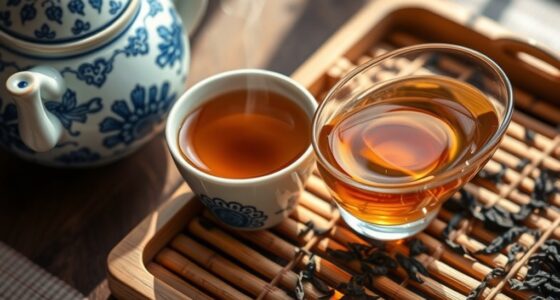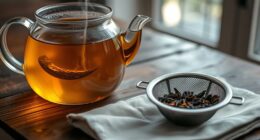Chinese herbal teas are more than just a warm beverage; they're a path to improved health. Rooted in Traditional Chinese Medicine for over 2,000 years, these teas promote balance and harmony in your body. They can help with digestive issues, inflammation, and immune support thanks to their rich compounds like flavonoids and polysaccharides. Ingredients such as ginseng and elderberry enhance immune functions and reduce cold symptoms. Plus, these teas are steeped in cultural significance, representing wellness and longevity. There's much more behind these brews, including their beneficial effects and the rituals surrounding them. Just wait until you uncover the full story!
Key Takeaways
- Chinese herbal teas have been used for over 2,000 years to promote balance and harmony in the body through holistic remedies.
- Key ingredients like ginseng and ginger enhance immune function and provide anti-inflammatory benefits, aiding overall health.
- Rich in antioxidants, these teas support detoxification and improve immune response, helping to prevent illnesses.
- Herbal teas hold cultural significance, symbolizing health and longevity, and are often consumed during important life events for their auspicious meanings.
- Regulatory challenges exist, emphasizing the need for user education on safety, potential side effects, and interactions with medications.
Introduction

Chinese herbal teas have stood the test of time, deeply rooted in traditional Chinese medicine (TCM) for thousands of years.
You'll discover that these herbal teas aren't just beverages; they're holistic remedies designed to restore balance and harmony within your body. By focusing on your overall health benefits, they target various health conditions, including digestive issues and inflammation.
When you brew a cup of Chinese herbal tea, you're tapping into a rich tradition of using carefully selected herbs like ginger and licorice root.
These teas boast antioxidant properties, aiding in detoxification and bolstering your immune system, which is essential for preventing chronic diseases. The unique chemical composition of these herbal teas, filled with beneficial compounds like flavonoids and polysaccharides, contributes to their anti-inflammatory and antibacterial effects.
As the popularity of Chinese herbal teas grows globally, more people are becoming aware of their potential health benefits.
Historical Use in Wellness

For over 2,000 years, herbal teas have played a vital role in traditional Chinese medicine (TCM), emphasizing a holistic approach to health and wellness. Historical texts reveal that green tea, derived from the Camellia sinensis plant, boasts anti-inflammatory properties and has been cherished for its medicinal effects since ancient times.
In TCM, herbal teas aren't just beverages; they're essential tools for promoting wellness and preventing disease.
Through their historical use, these teas have demonstrated significant health benefits, particularly in mitigating chronic health conditions like obesity and cardiovascular diseases.
Ingredients like ginger and puer tea have long been recognized for their therapeutic effects, such as alleviating colds and aiding digestion.
You'll find that the consumption of herbal teas is deeply woven into daily routines, fostering improved overall health and well-being.
Herbs Boost Immune System Function

Immune system support is crucial for maintaining overall health, and many herbs play a significant role in enhancing this vital function. Traditional Chinese herbal medicine offers a variety of herbal teas that can help boost health and strengthen your immune system.
Elderberry is renowned for reducing the duration and severity of cold and flu symptoms, while echinacea is another popular herb that many people turn to for immune support.
Ginseng, a staple in Chinese herbal teas, increases the production of immune cells, helping your body resist infections more effectively. Licorice root, often found in these teas, possesses antiviral properties, aiding in the fight against common diseases by inhibiting virus replication.
Additionally, ginger's anti-inflammatory effects can improve your immune response by promoting immune cell activity and reducing oxidative stress.
Regularly consuming these herbal teas, rich in immune-boosting Chinese herbs, can lead to improved overall health and a decreased risk of chronic diseases linked to immune dysfunction.
Cultural Significance in Rituals

Herbal teas hold a special place in cultural rituals, deeply intertwined with traditions that emphasize health and well-being. In Chinese culture, these teas aren't just for their medicinal properties; they symbolize health and longevity, making them vital in significant life events. For instance, during weddings and birthdays, specific blends are chosen for their auspicious meanings and health benefits, reinforcing the cultural significance of herbal teas.
During the Chinese New Year, families brew herbal teas to cleanse the body, promoting good fortune for the year ahead. This ritual reflects a deep-rooted emphasis on health and renewal. You'll often find herbal teas served during family gatherings and festivals, showcasing the importance of sharing healthful traditions with loved ones and strengthening social bonds.
In Traditional Chinese Medicine (TCM), drinking herbal tea is more than a daily habit; it's a mindful practice that promotes physical, mental, and spiritual well-being. By carefully selecting ingredients based on individual needs, you engage in a ritual that nurtures overall wellness.
This cultural significance of herbal teas illustrates how they play a crucial role in fostering both personal health and community connections.
Regulatory Issues With Herbal Products

While herbal teas play a vital role in cultural rituals and personal wellness, the regulatory landscape surrounding herbal products poses significant challenges. In many countries, including the United States, herbal products are classified as dietary supplements, which means they don't undergo the same rigorous pre-market approval as pharmaceuticals. This lack of regulatory oversight can lead to inconsistencies in safety and efficacy.
You mightn't realize that the FDA doesn't evaluate herbal products for effectiveness before they reach the market, leaving it up to manufacturers to ensure their products are safe and accurately labeled. This opens the door to potential contamination with harmful substances, such as heavy metals or pesticides, putting your health at risk.
Moreover, many people using Traditional Chinese Medicine may be unaware of possible side effects or interactions between herbal products and prescription medications. This highlights the pressing need for better education and guidance on the safe use of these products.
As you explore the healing powers of Chinese herbal teas, it's crucial to stay informed about these regulatory issues to make safe and effective choices for your wellness journey.
Practical Applications

As you integrate Chinese herbal teas into your wellness routine, you'll find they offer practical solutions for various health concerns. Traditional Chinese Medicine has a rich health history, using herbal teas to promote health for centuries.
For instance, ginger tea can help alleviate cold symptoms, while puer tea is known for aiding digestion. These herbal teas are packed with beneficial compounds like flavonoids and polysaccharides, which contribute to their antioxidant and immune-boosting properties.
By choosing specific formulas tailored to your needs, you can effectively restore balance within your body. Regular consumption of herbal teas, such as green tea, has also shown potential in reducing risks of chronic diseases like obesity and cardiovascular conditions, making them a smart addition to your preventive health strategy.
The growing popularity of these traditional remedies means you can easily find the ingredients you need. This accessibility allows you to embrace the benefits of Chinese herbal teas in your daily life, complementing modern medicine.
Conclusion
Incorporating Chinese herbal teas into your routine can offer a natural way to enhance your well-being. With a rich history and a deep cultural significance, these teas not only support your immune system but also connect you to ancient practices. While navigating regulatory issues is essential, you can still enjoy the numerous benefits these herbal brews provide. So, why not explore the world of Chinese herbal teas and experience their healing powers for yourself?










